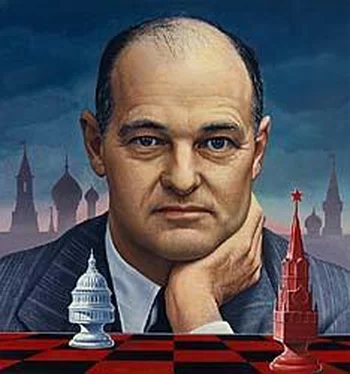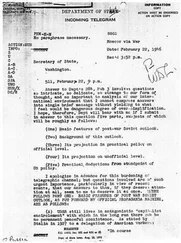Let it be stressed again that subjectively these men probably did not seek absolutism for its own sake. They doubtless believed — and found it easy to believe — that they alone knew what was good for society and that they would accomplish that good once their power was secure and unchallengeable. But in seeking that security of their own rule they were prepared to recognize no restrictions, either of God or man, on the character of their methods. And until such time as that security might be achieved, they placed far down on their scale of operational priorities the comforts and happiness of the peoples entrusted to their care.
Now the outstanding circumstance concerning the Soviet regime is that down to the present day this process of political consolidation has never been completed and the men in the Kremlin have continued to be predominantly absorbed with the struggle to secure and make absolute the power which they seized in November 1917. They have endeavored to secure it primarily against forces at home, within Soviet society itself. But they have also endeavored to secure it against the outside world. For ideology, as we have seen, taught them that the outside world was hostile and that it was their duty eventually to overthrow the political forces beyond their borders. Then powerful hands of Russian history and tradition reached up to sustain them in this feeling. Finally, their own aggressive intransigence with respect to the outside world began to find its own reaction; and they were soon forced, to use another Gibbonesque phrase, “to chastise the contumacy” which they themselves had provoked. It is an undeniable privilege of every man to prove himself right in the thesis that the world is his enemy; for if he reiterates it frequently enough and makes it the background of his conduct he is bound eventually to be right.
Now it lies in the nature of the mental world of the Soviet leaders, as well as in the character of their ideology, that no opposition to them can be officially recognized as having any merit or justification whatsoever. Such opposition can flow, in theory, only from the hostile and incorrigible forces of dying capitalism. As long as remnants of capitalism were officially recognized as existing in Russia, it was possible to place on them, as an internal element, part of the blame for the maintenance of a dictatorial form of society. But as these remnants were liquidated, little by little, this justification fell away, and when it was indicated officially that they had been finally destroyed, it disappeared altogether. And this fact created one of the most basic of the compulsions which came to act upon the Soviet regime: since capitalism no longer existed in Russia and since it could not be admitted that there could be serious or widespread opposition to the Kremlin springing spontaneously from the liberated masses under its authority, it became necessary to justify the retention of the dictatorship by stressing the menace of capitalism abroad.
This began at an early date. In 1924 Stalin specifically defended the retention of the “organs of suppression,” meaning, among others, the army and the secret police, on the ground that “as long as there is a capitalistic encirclement there will be danger of intervention with all the consequences that flow from that danger.” In accordance with that theory, and from that time on, all internal opposition forces in Russia have consistently been portrayed as the agents of foreign forces of reaction antagonistic to Soviet power.
By the same token, tremendous emphasis has been placed on the original Communist thesis of a basic antagonism between the capitalist and Socialist worlds. It is clear, from many indications, that this emphasis is not founded in reality. The real facts concerning it have been confused by the existence abroad of genuine resentment provoked by Soviet philosophy and tactics and occasionally by the existence of great centers of military power, notably the Nazi regime in Germany and the Japanese Government of the late 1930s, which indeed have aggressive designs against the Soviet Union. But there is ample evidence that the stress laid in Moscow on the menace confronting Soviet society from the world outside its borders is founded not in the realities of foreign antagonism but in the necessity of explaining away the maintenance of dictatorial authority at home.
Now the maintenance of this pattern of Soviet power, namely, the pursuit of unlimited authority domestically, accompanied by the cultivation of the semi-myth of implacable foreign hostility, has gone far to shape the actual machinery of Soviet power as we know it today. Internal organs of administration which did not serve this purpose withered on the vine. Organs which did serve this purpose became vastly swollen. The security of Soviet power came to rest on the iron discipline of the Party, on the severity and ubiquity of the secret police, and on the uncompromising economic monopolism of the state. The “organs of suppression,” in which the Soviet leaders had sought security from rival forces, became in large measures the masters of those whom they were designed to serve. Today the major part of the structure of Soviet power is committed to the perfection of the dictatorship and to the maintenance of the concept of Russia as in a state of siege, with the enemy lowering beyond the walls. And the millions of human beings who form that part of the structure of power must defend at all costs this concept of Russia’s position, for without it they are themselves superfluous.
As things stand today, the rulers can no longer dream of parting with these organs of suppression. The quest for absolute power, pursued now for nearly three decades with a ruthlessness unparalleled (in scope at least) in modern times, has again produced internally, as it did externally, its own reaction. The excesses of the police apparatus have fanned the potential opposition to the regime into something far greater and more dangerous than it could have been before those excesses began.
But least of all can the rulers dispense with the fiction by which the maintenance of dictatorial power has been defended. For this fiction has been canonized in Soviet philosophy by the excesses already committed in its name; and it is now anchored in the Soviet structure of thought by bonds far greater than those of mere ideology.
So much for the historical background. What does it spell in terms of the political personality of Soviet power as we know it today?
Of the original ideology, nothing has been officially junked. Belief is maintained in the basic badness of capitalism, in the inevitability of its destruction, in the obligation of the proletariat to assist in that destruction and to take power into its own hands. But stress has come to be laid primarily on those concepts which relate most specifically to the Soviet regime itself: to its position as the sole truly Socialist regime in a dark and misguided world, and to the relationships of power within it.
The first of these concepts is that of the innate antagonism between capitalism and Socialism. We have seen how deeply that concept has become imbedded in foundations of Soviet power. It has profound implications for Russia’s conduct as a member of international society. It means that there can never be on Moscow’s side an sincere assumption of a community of aims between the Soviet Union and powers which are regarded as capitalist. It must inevitably be assumed in Moscow that the aims of the capitalist world are antagonistic to the Soviet regime, and therefore to the interests of the peoples it controls. If the Soviet government occasionally sets it signature to documents which would indicate the contrary, this is to regarded as a tactical maneuver permissible in dealing with the enemy (who is without honor) and should be taken in the spirit of caveat emptor . Basically, the antagonism remains. It is postulated. And from it flow many of the phenomena which we find disturbing in the Kremlin’s conduct of foreign policy: the secretiveness, the lack of frankness, the duplicity, the wary suspiciousness, and the basic unfriendliness of purpose. These phenomena are there to stay, for the foreseeable future. There can be variations of degree and of emphasis. When there is something the Russians want from us, one or the other of these features of their policy may be thrust temporarily into the background; and when that happens there will always be Americans who will leap forward with gleeful announcements that “the Russians have changed,” and some who will even try to take credit for having brought about such “changes.” But we should not be misled by tactical maneuvers. These characteristics of Soviet policy, like the postulate from which they flow, are basic to the internal nature of Soviet power, and will be with us, whether in the foreground or the background, until the internal nature of Soviet power is changed.
Читать дальше



![Джеймс Купер - Пионеры, или У истоков Саскуиханны [The Pioneers, or The sources of the Susquehannah]](/books/395797/dzhejms-kuper-pionery-ili-u-istokov-saskuihanny-t-thumb.webp)








